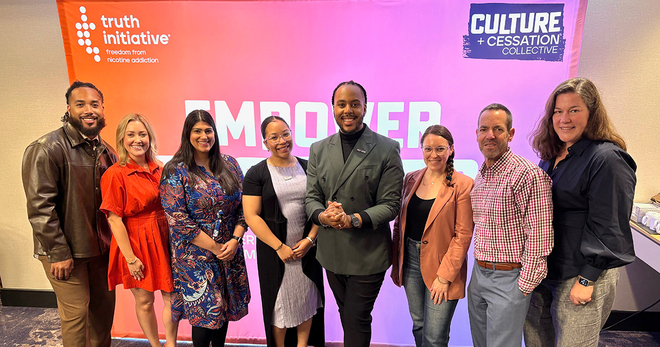How to recruit and retain young people to get better survey results
Traditional survey methods tend to fall short for young people. Many don’t have residential landline telephones, youth and young adults are less likely to pick up an unknown number on their mobile phones and web-only recruitment rarely yields the needed sample diversity.
Despite these challenges, Truth Initiative® researchers achieved a 72 percent retention between the first and second data collection points in a study evaluating the truth® campaign. In an analysis of their methods, published in Tobacco Control, Truth Initiative researchers share strategies that other public health groups can use to recruit and retain young people for surveys.
A multi-pronged recruitment strategy saves time
For most—67 percent—of the participants recruited, researchers used only address-based sampling resources. For the remaining 33 percent, researchers supplemented an address-based sample with data sources commercially available from marketing information firms, such as infoUSA and Experian, to increase response rates.
Researchers also tapped other strategies, including money and humor. To incentivize those without home internet access to participate, their financial reward was higher than others, and researchers used humor in their email and social media reminders to finish the survey.
Web-based surveys are faster and more accurate
Asking participants to complete the surveys online, instead of by telephone, was important for several reasons. Research shows youth and young adults are more likely to complete an online survey, and entering data into a computer, instead of communicating with a human data collector, yields more honest answers and more accurate data. Additionally, entering data is quicker, saving the participant and researcher time.
Overall, data collection was one to two months faster than the standard time for telephone or in-person data collection methods.
Challenges include underrepresented minorities
Despite efforts, Hispanic youth and young adults were still underrepresented. Researchers recommend recruiting for future studies by targeting youth and young adults with known Spanish last names or in Hispanic neighborhoods.
“Despite challenges with recruitment, this methodology provides opportunities for developing robust representative samples that can be retained over time via online platforms,” said Jennifer Cantrell, managing director of Evaluation Science and Research at Truth Initiative and lead author of the study.
Key takeaways
The time saved using online data collection instead of in-person or telephone strategies.
The percentage of the retention between first and second data collection phases.
More in tobacco prevention efforts
Want support quitting? Join EX Program
By clicking JOIN, you agree to the Terms, Text Message Terms and Privacy Policy.
Msg&Data rates may apply; msgs are automated.


